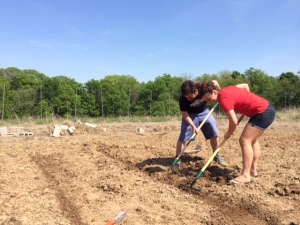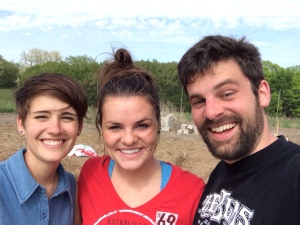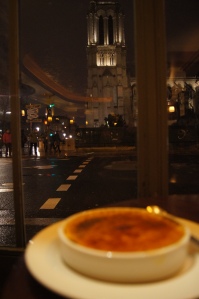Moving to wateredlove.com
February 10, 2015
Hi, all: I’ve revamped my site and I’m moved to http://wateredlove.com. Please check in there for new posts.
I’ll be moving subscriptions there too, so you should automatically get emails. If that doesn’t work, please resubscribe
Back to Reading in KS
November 14, 2013
I’ve been back in the US for a little over three months. This astonishes me. Time seems to be moving so much faster this fall than last, though that’s probably just a perspective thing or a busy-ness thing or a “I live in a place that’s more familiar and therefore, relatively less difficult” thing. I’m finally getting into a rhythm/schedule. I’m finally finding time to see friends on a more regular basis and not just a “I’m back from Russia! Let’s get coffee!” visit. Finally getting a handle on workload and learning how to grade student essays more efficiently and how to abandon work at 8 pm…or sometimes earlier. I’m finally starting to write again more regularly. Finally starting to make sense of the last year and a half of my life, what I’ve learned, what Russia means to me. I have not, however, found time yet to make an eye doctor’s appointment, wash my new car before winter sets in, or fully unpack my apartment–winter break?
 What I want to write about, though, is finally making it back to Lawrence for a reading. The things above will likely take a few more weeks (months? years?) of reflection to come together.
What I want to write about, though, is finally making it back to Lawrence for a reading. The things above will likely take a few more weeks (months? years?) of reflection to come together.
While I was in Moscow, my chapbook Attachment Theory was released, so I never got to have an “official” release reading/celebration. Finally, after three months back, I got around to doing that. The Raven (which became my favorite bookstore almost as soon as I moved to Lawrence, not just for its selection and atmosphere but also for the way it support local writers), agreed to host. I invited fellow writers (more importantly friends) Ben Pfeiffer and Mary Stone Dockery to read with me. I saw no better way to introduce my chapbook and celebrate my “return to America” than with them.
 I don’t have a lot to say about this reading except that it felt great. I was so happy to be in Lawrence. I was so happy to read with Mary and Ben and to look out and see an audience full of friends. When I stepped up to the mic, I realized that I was less nervous than I’ve ever been for a reading. It’s likely I gained some confidence living abroad for a year; Russia requires a bit more directness, a harder shell than the Midwest. But it seems more likely that when I looked into the audience, I realized that with the exception of a few folks, everyone was a friend…friends sitting there, glad I went but glad I’m back, smiling, waiting to hear poems and stories about Moscow.
I don’t have a lot to say about this reading except that it felt great. I was so happy to be in Lawrence. I was so happy to read with Mary and Ben and to look out and see an audience full of friends. When I stepped up to the mic, I realized that I was less nervous than I’ve ever been for a reading. It’s likely I gained some confidence living abroad for a year; Russia requires a bit more directness, a harder shell than the Midwest. But it seems more likely that when I looked into the audience, I realized that with the exception of a few folks, everyone was a friend…friends sitting there, glad I went but glad I’m back, smiling, waiting to hear poems and stories about Moscow.
Parents in Moscow.
September 10, 2013
 The trip started off a little rocky–the airline lost their luggage. And for a few days, it seemed legitimately lost. Each time we called the airline, we were told it was in a different spot (in NYC, in Moscow, one bag in each place). Eventually, they just started hanging out on my dad, which as you might imagine, frustrated him. Finally, with Svetlana’s Russian language skills, we found the luggage. I was so proud of them, though.
The trip started off a little rocky–the airline lost their luggage. And for a few days, it seemed legitimately lost. Each time we called the airline, we were told it was in a different spot (in NYC, in Moscow, one bag in each place). Eventually, they just started hanging out on my dad, which as you might imagine, frustrated him. Finally, with Svetlana’s Russian language skills, we found the luggage. I was so proud of them, though. 
Dawn says:
I just have to say this: Jeff took all of my stuff. He said WHAT I was going to say. He is always doing that to me. It’s just not fair. But, maybe if I try really hard I can find some little delicious detail that he might have dropped along the way.
Oh, good—I found something.
 Upon our arrival to Moscow, Kara graciously guided her travel-worn parents to the flat. After many long hours of travel, we had arrived!! We were there; our luggage was not. Kara gave us several clear, concise instructions: take a nap, take a shower, and most importantly, DO NOT leave this apartment without me.
Upon our arrival to Moscow, Kara graciously guided her travel-worn parents to the flat. After many long hours of travel, we had arrived!! We were there; our luggage was not. Kara gave us several clear, concise instructions: take a nap, take a shower, and most importantly, DO NOT leave this apartment without me.
But, just in case we did not heed her sage advice, she gave us an index card filled with strange, scary looking scribbling, which according to her was our Russian address. She sincerely hoped that we would not venture out without her.
Just for the record, I never went anywhere without Kara. I was good; I listened. Jeff did not. He had to show off every morning by going out into the world to get coffee. The little note card reminded me of the little laminated yellow school bus that I attached to Kara’s shirt on the first day of Kindergarten. I remember her being so excited about getting on that big old yellow bus and going away from me. I worried whether I had prepared her for going out into the world. Would she really be able to find her bus to get back home? All of the little things that we parents agonize over again and again. She was fine; I was fine.
After having been all the way to Moscow to see my daughter, I am amazed at just how far away our children may go. I was very proud and impressed with her ability to navigate the metro in Moscow, and how very protective she was with us. Learning a new culture, a new language, a new money system are not easy tasks.
After hearing Kara talk about her Moscow—the Kremlin, Gorky Park, Georgian food, St. Basil’s Cathedral, well like anyone, I began to whine and say: “I want to go too. Why can’t I come?” I am so very thankful that we were able to see Kara’s Moscow. So, Kara, thanks watching out for us. Your friends were all so kind and helpful. Without Sveta ‘s help, I seriously doubt we would have gotten our luggage before we were to leave on the next leg of our journey. And thanks for being such a wonderful friend to Kara.
My only question is where are we going next? And can we bring your little sister?
Guest Blog: Jack in Moscow
July 22, 2013
A guest blog from my third visitor, my boyfriend, Jack Kynion III, who visited Moscow at the end of May/beginning of June.
What to say of Moscow? Was it a good trip? Uh… what’s a good trip? For those of you with a weak stomach for rom-coms, read no further. After all, my only incentive for visiting Moscow, Russia, was to see a particular bright-eyed, beautiful young woman. The creator of this blog in fact. As such, I imagine this rambling, self-involved blog post will be full of corny moments, with over-indulgent descriptions of scenery sprinkled in. Well, unless the editor (take a guess who that is) cuts out all of the aforementioned gooey moments.
It seems cliché, but how do you not mention the flight over? A ten hour flight over the extreme northern hemisphere is a trek so few of us take that it makes us all curious about it. My review? It’s not so bad. Kind of boring because clouds, though magnificent, are pretty much just clouds. The inflight entertainment isn’t terrible. New releases, not-yet-released releases, and a fascinating graphic where the plane is gigantic compared to the incredibly inarticulate map. In truth, I didn’t really notice much of the time because on the flight and during my last two weeks of law school finals, in my mind, I was already in Moscow.
 I don’t know if the relatively lax nature of Russian airport security is a good reflection on the TSA or not. On the one hand, we can rest assured that there is nowhere in the world (save maybe Israel) where more people are frisked, eyed, and made generally uncomfortable in order to fly than the U.S. of A. This should provide a relative sense of safety. On the other hand, I’m not sure what it says about one of the most liberal (read philosophically, not politically) democracies in the world, that the capital of the FORMER SOVIET UNION has easier entrance policies than we do. Interestingly, I wrote this line a couple of weeks before Snowden Gate. No matter, I didn’t notice much of it anyways.
I don’t know if the relatively lax nature of Russian airport security is a good reflection on the TSA or not. On the one hand, we can rest assured that there is nowhere in the world (save maybe Israel) where more people are frisked, eyed, and made generally uncomfortable in order to fly than the U.S. of A. This should provide a relative sense of safety. On the other hand, I’m not sure what it says about one of the most liberal (read philosophically, not politically) democracies in the world, that the capital of the FORMER SOVIET UNION has easier entrance policies than we do. Interestingly, I wrote this line a couple of weeks before Snowden Gate. No matter, I didn’t notice much of it anyways.
The whole walk from the airplane was just entranceway after entranceway. Not being a frequent international flyer I wasn’t sure which entrance way was the one that finally let me out. The one that finally let me get to Kara. So, I rounded every corner with an air of expectancy only to be disappointed. But I remained focused. Passport control, Customs, none of these were going to deter me. When I finally got through, there she was, smiling and not completely sure how to greet me.
When you don’t see someone for nearly five months you aren’t sure where to put your hands. You sort of have to remember through trial and error how to hug. And then you do and you remember why it was so hard to focus through finals week. Most everything else was a blur that day. 5,000 miles in the air can do that to a person. I didn’t care much because I was where I wanted to be for the first time in a while.
 As for Moscow, I didn’t like it very much, but my position softened as the days went by. The feeling of pressure that permeates the air became more understandable with time. What seems to be a fairly authoritarian government may still be an improvement from darker times. The effects of both of those systems can still be felt. But as I grew accustomed to that feeling, I was able to notice the little things a little bit more. Little things like the necessity of exact change, the lady on the street that sells the yogurt Kara likes, the incredible efficiency of the Moscow Metro system. And eventually I made up my mind about Moscow: it’s a tough place to live that has scores and scores of pretty decent people, trying to make it through the day. The strangest thing about it was that it didn’t seem to possess that rabid energy indicative of big cities like London or New York, except in a few places. Actually, the weirdest feeling came in the evening for me. Dusk seems to last from 7:30 to 11:30, which leaves you in a state of perpetual shutting down. Like computers trying to install an update of Windows 98. You look outside, it’s 10:30-11:00, and the sun is still peaking back at you. It makes everything slightly nostalgic.
As for Moscow, I didn’t like it very much, but my position softened as the days went by. The feeling of pressure that permeates the air became more understandable with time. What seems to be a fairly authoritarian government may still be an improvement from darker times. The effects of both of those systems can still be felt. But as I grew accustomed to that feeling, I was able to notice the little things a little bit more. Little things like the necessity of exact change, the lady on the street that sells the yogurt Kara likes, the incredible efficiency of the Moscow Metro system. And eventually I made up my mind about Moscow: it’s a tough place to live that has scores and scores of pretty decent people, trying to make it through the day. The strangest thing about it was that it didn’t seem to possess that rabid energy indicative of big cities like London or New York, except in a few places. Actually, the weirdest feeling came in the evening for me. Dusk seems to last from 7:30 to 11:30, which leaves you in a state of perpetual shutting down. Like computers trying to install an update of Windows 98. You look outside, it’s 10:30-11:00, and the sun is still peaking back at you. It makes everything slightly nostalgic.
For me, going to Moscow had some unintended results. I hadn’t considered how much sitting time I would have because Kara had to work part of the time I was here. I didn’t anticipate that I would spend time thinking about what I wanted to do with my life. I didn’t know that having nothing to do would be such a liberating feeling. I think they call it vacation. Mostly, though, I didn’t know that being with Kara was going to make everything feel more in its own place.
 I’ve been trying for weeks to explain in conversation what my trip to Moscow was like. Sometimes I express it in a series of vignettes. Sometimes I try to work deductively from broad principles to explain what Moscow is. Most of the time, I sheepishly explain that I didn’t see many tourist-y things because I didn’t care much about seeing much besides Kara. And now I have to describe in writing something I can’t explain in talking. I’m much better at talking.
I’ve been trying for weeks to explain in conversation what my trip to Moscow was like. Sometimes I express it in a series of vignettes. Sometimes I try to work deductively from broad principles to explain what Moscow is. Most of the time, I sheepishly explain that I didn’t see many tourist-y things because I didn’t care much about seeing much besides Kara. And now I have to describe in writing something I can’t explain in talking. I’m much better at talking.
So, in lieu of trying to write as well as Ben Pfeiffer or be as funny as Molly McCleery, I will conclude with a short list. Anyone that knows Kara M. Bollinger will understand that this ending is an homage of sorts to her, the ultimate list maker.
- I love being an American. I am thankful to God for the cosmic event that allowed me to be born here. And there is nothing like Kansas heat and humidity during summer, a strange thing that I missed.
- Kara’s friends in Moscow are caring, hospitable, people who I hope will be well loved and taken care of in their lives. They have done a wonderful job of caring for her and I am thankful for that.
- The only thing I feel I missed out on was sitting in one of the huge beanbag chairs in Gorky Park.
- It’s inexpressible how blessed I am to have been able to travel to Russia to see my girlfriend AND visit Jerusalem, Israel AND visit Venice, Italy a week after getting out of law school. They haven’t yet made words in English that can express the immensity of my blessings.
- Little things on big trips are worth more to me than big things. Like the family in the airport in Rostov. Three daughters, mother and father. Abuzz in the waiting room chatting, arguing, smiling, just being a family. I couldn’t understand a single word but I’m real happy I got to watch them awhile.
- Kara is a friggin’ champion for braving Moscow for an entire year.
- I’m proud of her.
- I love her more now than before I went to Russia.
So, yeah, I had a good trip.
Dacha
July 15, 2013
Two weeks before I moved to Moscow last August, I read a National Geographic article about dachas, Russian summer homes. Gardener that I am, I knew that living in an enormous city for a year would be difficult, especially a city in a country with such a long, dark winter. So, I vowed to get to a dacha. Later, some of my American friends who study Russian said “If you get the chance to visit a dacha, go.” They described never-ending food and vodka; long, sunny days; gardens; and a break from Moscow stuffiness.
The culture surrounding dachas fascinates me. They’ve apparently been around since Peter the Great, but they became more common in during the Soviet Period, when the government gave land to citizens. This land had strict regulations attached to it–since it was to be used for gardening, the new landowners couldn’t built anything bigger than a shed for tools and maybe a small area to sleep overnight. Now those restrictions have been dropped, and people can buy their own land and build whatever they like (within village regulations, I assume). Depending on the village and the owner, some dachas are mansions and some still look like gardening shacks. As the NG article points out, the purpose of the dacha is now contested–for many members of older generations it’s a place to work; for some, it’s a place for the family to be together; for the younger generation, it’s a place to relax; and for the elite, it’s another way to exhibit wealth; for others, it’s a mixture.
 I have no research to back this up, but I’d guess that well over half of Moscow’s families own dachas; obviously, from the middle and upper classes. On Friday evenings and Saturday mornings, the traffic leaving the city is ridiculous and makes the normal 45 min to 2.5 hour drive to the dacha last anywhere from 3 to 6 hours; the same thing happens on Sunday evenings when people return. For many Muscovites, going to the dacha isn’t something to do a few times a summer, but every weekend; my Moscow best friend, Sveta, gets legitimately upset if she doesn’t make it to the dacha each weekend, and after visiting one, I understand why. Some people go there for the entire summer, like my friend Anya who took her 3-month old daughter to the dacha in May and is still there.
I have no research to back this up, but I’d guess that well over half of Moscow’s families own dachas; obviously, from the middle and upper classes. On Friday evenings and Saturday mornings, the traffic leaving the city is ridiculous and makes the normal 45 min to 2.5 hour drive to the dacha last anywhere from 3 to 6 hours; the same thing happens on Sunday evenings when people return. For many Muscovites, going to the dacha isn’t something to do a few times a summer, but every weekend; my Moscow best friend, Sveta, gets legitimately upset if she doesn’t make it to the dacha each weekend, and after visiting one, I understand why. Some people go there for the entire summer, like my friend Anya who took her 3-month old daughter to the dacha in May and is still there.
I’ve never seen anything like dacha culture. Sure, Americans make a mass exodus for certain summer holidays and many people own lake houses, but it is nothing like this. It makes sense, though, right? If you get 3 months of enjoyable/warm weather, you won’t waste them. This is why Musocvites line park benches every night after work, why old men sunbathe in Speedos at 7 am, why people stand in the most awkward positions just to be in the sun and not the shade made by trees in the forest, as if they can get all the Vitamin D their bodies need in a 3 months. Maybe they can. 
At the end of June, I finally made it to a dacha, that of my friends Anya and Nastya’s family. Unfortunately, Nastya and I couldn’t devote the entire weekend, so we left at 8 am on Saturday morning. The 1.5 hour drive only took 3 hours, so Nastya said that the traffic wasn’t too bad. My first surprise was that dachas are all different, not a series of wooden houses with flowers as I’d expected. Some were wooden, but some had siding and a few were even brick.
As I mentioned earlier, Anya is there this summer with her daughter Masha, her parents, and their aunt; Anya’s husband Dima commutes from Moscow every weekend by train. I’d hardly been introduced to the family before Anya asked if we wanted to pick strawberries, which we had with творог for a late breakfast.
 Though they didn’t speak much English, Anya and Nastya’s parents were incredibly kind and hospitable to me and we talked through Anya and Nastya’s translations. They sold their old dacha and built this one about seven years ago.
Though they didn’t speak much English, Anya and Nastya’s parents were incredibly kind and hospitable to me and we talked through Anya and Nastya’s translations. They sold their old dacha and built this one about seven years ago.
Shortly after breakfast, we went in search of berries. I’d been told to pack long sleeves and pants to avoid mosquitoes. The family scoured the house for a hat, boots, and socks for me, and Nastya and Anya’s father emerged with six hats for me to choose from, but as often happens in Russia, someone else made my decision–I was given the hat with the most coverage, camouflage and with a cape. I felt like I was going into the desert. While we waited for the rest of the family, Nastya laughed “The most fun part of going to the forest is getting dressed for the forest.” 
I learned two things in the Russian forest: First, Russia has a lot of mosquitoes. Though the hat made me look funny, I was thankful to have it. I must have reapplied bug spray 5 times and still had bites the next day. Second, berry picking is serious business. Nastya and Anya’s mom Olga was quick and thorough. We were looking for these berries that are essentially mini blueberries (we later used the dacha’s WiFi…yep, Dacha WiFi (and though I brought it along, I refused to used my tablet)…to learn that they’re actually called “bilberries”) and though we passed bushes of them, she trudged on through tall grass and fallen trees until finally, we found an area that she deemed mostly untouched. When we finished, Olga had picked three times as many berries as anyone else. We also stopped for mushrooms, mini-strawberries, and wildflowers.
After lunch, we went to visit one of their neighbors. Her land is actually a few plots put together and she’s filled it with an enormous garden: onions, beets, corn, cabbage, sunflowers, potatoes, strawberries, raspberries, flowers, and two greenhouses with tomatoes, peppers and cucumbers. We talked about her methods and the full work days she puts into the garden. She sent me off with strawberries, peppers, and cucumbers.
The rest of the day was spent talking and resting and playing with Masha. After a walk and some cake with tea, it was time to leave. I felt tired, the same wonderful, fulfilling tired I felt as an 8-year-old at the end of an evening spent in the backyard collecting lightening bugs. They sent me away with wildflowers, bilberries, and strawberries. 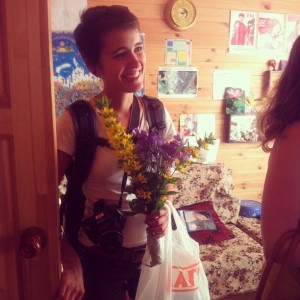
As we left, Anya’s father said “Well, your dachas in America must be better,” and I replied “No, we don’t have them.” I considered adding that we should have them, but honestly, I don’t think this would work as perfectly anywhere else.
About a month ago, boyfriend Jack graduated from law school. Five days after that, he came to Moscow, and though he’s been back in KS for a few weeks now, I’m incredibly happy and thankful about his 2.5 week visit here. Obviously, I’ve been incredibly happy and thankful for all my visitors, but because of some visa complications, I thought boyfriend Jack wasn’t going to make it here…or at least not on time. In a nutshell, the travel service we used for his visa lost all of his application materials (including his passport).
When Jack called to inquire (multiple times a day for weeks), they said “We’ll call back” and then never did. I thought I might be able to help from Moscow, thinking that maybe the moral support and more “forceful” communication style of the three Russian women digitally and physically with me (Russia bestie Sveta, boss/friend Olga, and travel coordinator Oxana) would help. Below is the conversation I had with the travel company (tc):
tc: “Uh…Ma’am, we’re currently looking for that application.”
kb: “What do you mean you’re ‘looking for it’?”
tc: “Well, just that.”
*Silence*
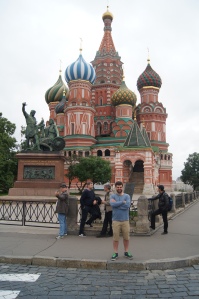 Anyone who has traveled to Russia (or any other country requiring a visa) will tell you that visa stuff is frustrating and difficult and that no matter what you do, you will probably make a mistake. I made a mistake in my visa that caused me to come to Russia a week late in August; bestie Molly had to resubmit her application; and the Pfeiffers had to wait a long, long time for theirs to arrive. This was the worst problem I’d encountered though…and there wasn’t much we could do about it.
Anyone who has traveled to Russia (or any other country requiring a visa) will tell you that visa stuff is frustrating and difficult and that no matter what you do, you will probably make a mistake. I made a mistake in my visa that caused me to come to Russia a week late in August; bestie Molly had to resubmit her application; and the Pfeiffers had to wait a long, long time for theirs to arrive. This was the worst problem I’d encountered though…and there wasn’t much we could do about it.
They eventually found it (four days before his flight)–it had apparently gone from the Russian consultant in Washington DC to the Russian consulate in Seattle without anyone really making note of that.
*Silence*
The consulate requested a new document from Russia, and Oxana got that within two hours (even though it was already 8 pm in Moscow). Sveta was even willing to forge documents, though she may not admit it now. Jack and I prayed a lot. And the visa arrived two days before his flight.
I say all that to say:
1. When you think your boyfriend you haven’t seen for almost five months isn’t going to get to come to Moscow, you are sad. When you find out that said boyfriend does in fact get to come and then you actually see him in the airport–in real life 3D and not through a Google+ Hangout–you are thankful and relieved and though you have to work during the days, you take him to all the Moscow places and make him pose for photos in the evenings. 
2. You bring him to work with you the first few days because even though he can’t really do anything there and you are busy, you just. can’t. bear. to. be. apart. Plus, you’ve told all these great stories about people at work and you’ve complained so much about the stairwell with the tiles that are coming unglued and you’ve said zapekanka is so so good that you want him to meet these people and see these things and try this food. So, he sits outside of your office and contentedly reads and plays Solitaire, and your Russian friends are more hospitable to him than you are, because you know he is totally happy, but it is in their nature to continually ask if he is comfortable or hungry or thirsty.
3. You cook for him a lot because you are happy and because you realize you’ve gotten lazy with meals in the last few months. You assume he won’t want to have scrambled eggs both for breakfast and dinner, so you decide on spaghetti. The two of you can’t find garlic, but you improvise cheese bread and the whole meal is actually quite good. He insists on moving the tiny table from the kitchen to the living room so you can sit across from one another, and though it blocks the doorway to the kitchen and makes getting anything from the kitchen difficult (because your apartment is real small) it ends up being a great idea so you do it for every meal. You both decide that successful meals, even simple ones, taste better in Russia because they’re harder to make. And then the sunsets around 10:30 pm. 
4. He cooks for you, too, normally breakfast. On your birthday, he goes to the grocery store alone and comes back with keifer instead of milk, which is not what you use for French toast, so you go back to the store with him. 
5. You also realize that it’s pretty awesome to be treated on your birthday. After church, he takes you out for coffee and cake and then Georgian food with your friends and buys you a ukulele and flowers. 
6. You try new things. You want to take him golfing. To get there you have to confront one of your greatest fears–the bus–and it only ends up being a little scary. Even though you stare at the Moscow map on your tablet and then check street names out the window the whole time because you are just that nervous about getting lost (or perhaps because you check the street names with the Moscow map on your tablet the whole time), you don’t get lost. 
You were never afraid of the ice cream stand, but you go there for the first time and discover the Maxibon (a Nestle crunch ice cream bar plus an ice cream sandwich). He convinces you that the Maxibon can serve as lunch. Some days you have two. 
7. You also might travel. But that’s another blog.








 While having the garden
While having the garden  The pastor mentioned that members of the church might be interested in gardening too, especially once someone else had shown interest. Initially, I was modest in my land acquisition, but when no one came, I expanded.
The pastor mentioned that members of the church might be interested in gardening too, especially once someone else had shown interest. Initially, I was modest in my land acquisition, but when no one came, I expanded.

